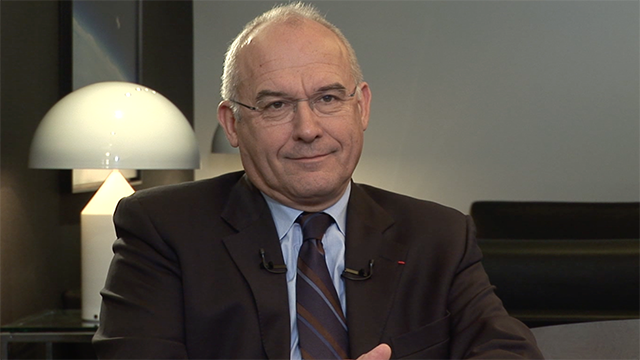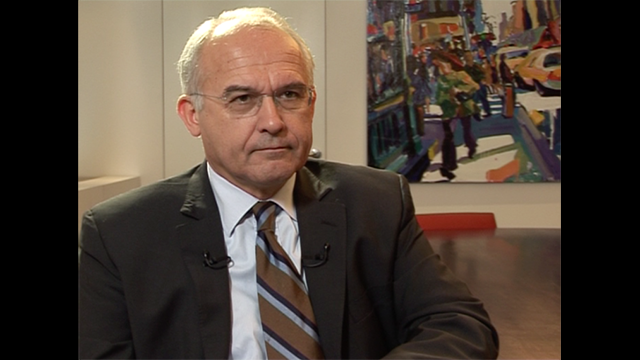EuroBusinessMedia (EBM): Valeo, one of the world’s leading automobile suppliers, just reported full-year profits for 2007. Thierry Morin welcome.
Thierry Morin (TM): Hello,
EBM: You are the CEO of Valeo. What is your comment on the company's performance for 2007?
TM: Well the first thing, it’s a good performance and improvement as compared with 2006. Secondly it is a year of turnaround. 2007 first half was still in a kind of downturn in terms of sales and in terms of operating margins. And you’ve seen that this was reversed in the second half of the year with high turnover growth and secondly with high operating margin improvement. So this is a good year, this is equally a year where we have reduced the debt of Valeo from 55% gearing down to 45% gearing ratio, and now the debt is below 800 million.
EBM: Now, would you say that this trend of the second half of the year is sustainable in today's uncertain context for the automobile industry?
TM: Certainly, Veleo would be affected if there were a significant downturn in the industry. But as we have organised ourselves in order to be able to face such kind of headwind, you must know that the new products of Valeo do not replace current products but come in addition, because when I sell a lane departure warning system, a blind spot detection system or a StARS system, we continue to sell the other commodities products that we have in our portfolio, which means that the content of Valeo per car will increase, and we hope that this might very well compensate for some market decreases.
EBM: It sounds like you’re quite confident about the future, which is unusual in today's environment. Why are you so confident ?
TM: I’m not so confident, I’m determined. This is very different. And I’m organising the team as to be determined. We believe furthermore that the new product generation that we have, we believe that the operational excellence plan that we have launched -- including purchasing, including quality, including industrial footprint -- will lead our clients to buy more from us. If we have at all times the best quality, with goods at an acceptable cost, and differentiating technologies, they will not go to the competition, they will come to us.
EBM: You just mentioned your strategy in terms of “operational excellence”, be it in purchasing, in your industrial footprint worldwide or in quality control. Could you briefly provide us with a situation update on your improvements in these different areas?
TM: Maybe the thing which I’m the most proud of is quality. We have this year attained the 10 PPM ratio which means that we are at ten defects per million parts produced. This is a very, very interesting level. I do not believe that many of our competitors have such a level and, what’s more, we come from a very high level of 300-500 PPM years ago. I believe that this is probably the most significant improvement that will help clients to come more to us. Secondly, in terms of cost efficiency, it’s very clear that we have now 125 factories. Six years ago we had 170 factories. We have closed down or sold 89 of those. We have opened more than 40 in countries where costs were lower. So we believe altogether that we have now a very good industrial footprint. You talked about purchasing as well - we are now acquiring 37% from lower cost countries, whereas it was 33% last year and say 2-3% only five years ago. So altogether we are improving very much our cost basis. Those three factors which you called ‘operational excellence’ -- this is our word -- have to come in addition to the differentiating technologies. You might note that on all the new products of Valeo we barely have any competitor -- or just a few -- and this is what we try to do: help our clients in fields like safety and being ‘greener’, having a car that is cleaner. It is very important: there is not a single country today that is not looking to improve emissions and improve safety in cars. This is why we are working on those two fields.
EBM: You've made some disposals and you've reduced your level of debt. Are you considering making acquisitions now? And if so, in what businesses?
TM: Absolutely, and by the way we just acquired in 2007 a small company in Ireland called Connaught Electronics. It’s very small in terms of size, but it allows us to become a champion in image treatment. And it’s very important for us. We will have a bird’s eye view of the car. Imagine that you drive your car just as if you had a joystick - your steering wheel becomes a joystick - because in the car you have a screen and on the screen you see your car and its short-term environment from above. Therefore, for example if you are in one of those underground parking lots, you will have no difficulties parking to the centimetre, even in a very difficult environment. So we will do acquisitions when it brings to Valeo a technology asset, if I may say. So we are permanently looking for those potential -- I wouldn’t say preys -- I would say potential partners.
EBM: You are continuing to make significant investments in R&D -- what returns do you expect and when?
TM: We spend every year around 5.5% in R&D. It’s not the same, every year we improve by some 15% the productivity of this R&D. Which means actually the effort is more and more but the cost is equal, which is important. You might have seen that we are now becoming a champion in launching new products, which was not the case in the past. And those new products are appealing to our clients. If I just take a few examples: our first micro-hybrid - we are taking more and more orders - you have it on Citroen C1, C2 you have on Smart MHD, and you will find it on several French vehicles before the end of the decade. If you look at a product like Park 4U, we now have nearly 15 orders for that product. So what is very interesting is that not only do we see that one or two clients are interested, but most clients are now appealed by these new products. I believe this is the contribution of R&D.
EBM: And finally, you do confirm your 6% operating profit margin for 2010 -- what is your strategy to reach that objective?
TM: So we need to fill a gap of nearly 3 percentage points, 2.5% actually. We have three objectives. Point number one: group reengineering - we’ve started this reengineering some 12 months ago, it’s starting now to bear fruits. We believe that we can gain roughly 1 point through this reengineering of all major functions of value: quality, logistics, finance, research and development, human resources and so on. Secondly, we also have a technology plan which helps us improve sales. And we have not talked a lot about growth, but the growth has started in the second half of this year at a level higher than 6%, and for the whole year the volumes have increased by 6%. I am anticipating that this continues, and it should have a beneficial impact on the operating margin of roughly 1 point. And the third point comes from purchasing, because we believe that if there is a plateau in raw materials -- which I truly believe -- I’m talking about non ferrous, I’m talking about oil, which are today at a very high level, but which should stay at this high level. And if it is so, they will be more and more included in the contracts, because when we were having 2003/4 contracts delivered in 2006/7it was very difficult for us. But now the contracts of 2006 have already included these high prices for raw materials, and therefore when we deliver it will be less painfull, if you will. So 1+1+1 are my three points, and added to the 3.6% that we have delivered this year, I believe that we will be above 6%. But it’s more than that – it’s not only the 6% of operating income margin which is imporant. We will multiply it by 4.5 times in terms of capital return. And it’s important, because five years ago we were returning our capital 3 times, and now we return it 4 times, we will return it 4.5 times, which means that we will deliver a return of 27% on capital, which we believe is very attractive.
EBM: Thierry Morin, CEO of Valeo, thank you very much indeed.
TM: Thank you.



